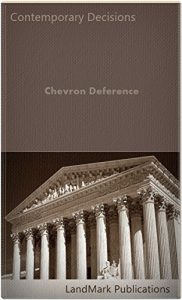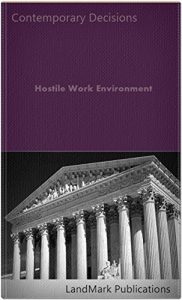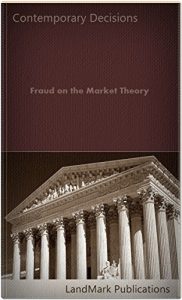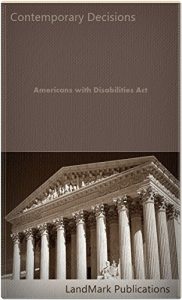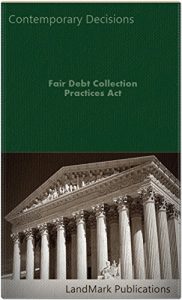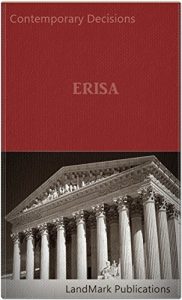THIS CASEBOOK contains a selection of 170 U. S. Court of Appeals decisions that analyze, interpret and apply the Chevron doctrine. The selection of decisions spans from 2009 to the date of publication.
Chevron deference applies when an agency interprets ambiguous language in its enabling statute. Chevron, U.S.A., Inc. v. Natural Resources Defense Council, Inc., 467 U.S. 837, 104 S.Ct. 2778, 81 L.Ed.2d 694 (1984). Rohr v. Reliance Bank, 826 F. 3d 1046 (8th Cir. 2016).
Generally, when we confront questions implicating "an agency's construction of the statute which it administers," and "the statute is silent or ambiguous with respect to the specific issue," we ask "whether the agency's answer is based on a permissible construction of the statute." Chevron, U.S.A., Inc. v. Nat. Res. Def. Council, Inc., 467 U.S. 837, 842-43 (1984) (footnotes omitted). In doing so, we accord "considerable weight" to an agency's construction, and only set it aside if it is "arbitrary, capricious, or manifestly contrary to the statute." Id. at 844 (footnote omitted). But where an agency's construction does not carry the force of law, Chevron deference may be inappropriate. See United States v. Mead Corp., 533 U.S. 218, 226-27 (2001). Estrada-Rodriguez v. Lynch, (8th Cir. 2016)
Not all agency interpretations of a statute are entitled to Chevron deference. Instead, "such strong deference 'is limited to circumstances where (1) Congress has given the agency authority to make rules carrying the force of law and (2) the agency's interpretation is rendered in the exercise of that authority.'" Knox Creek Coal Corp. v. Sec'y of Labor, Mine Safety & Health Admin., 811 F.3d 148, 158 (4th Cir. 2016) (quoting A.T. Massey Coal Co. v. Holland, 472 F.3d 148, 166 (4th Cir. 2006)); see United States v. Mead Corp., 533 U.S. 218, 226-27 (2001). Hogge v. Wilson, (4th Cir. 2016).
An agency's expertise with respect to a statute does not automatically require a grant of Chevron deference to the agency's interpretation of that statute. See, e.g., United States v. Mead Corp., 533 U.S. 218, 234, 121 S.Ct. 2164, 150 L.Ed.2d 292 (2001) (no Chevron deference to Customs classification rulings). For Chevron deference to apply, the interpretation must be in an area where Congress has delegated authority to the agency. In other words, the interpretation must relate to the agency's congressionally delegated administration of the statute, typically its exercise of regulatory authority. "Chevron deference ... is not accorded merely because the statute is ambiguous and an administrative official is involved. To begin with, the rule must be promulgated pursuant to authority Congress has delegated to the official." Gonzales v. Oregon, 546 U.S. 243, 258, 126 S.Ct. 904, 163 L.Ed.2d 748 (2006) (citing Mead, 533 U.S. at 226-27, 121 S.Ct. 2164). Del Grosso v. Surface Transp. Bd., 811 F. 3d 83 (1st Cir. 2016).
. . .
Chevron deference applies when an agency interprets ambiguous language in its enabling statute. Chevron, U.S.A., Inc. v. Natural Resources Defense Council, Inc., 467 U.S. 837, 104 S.Ct. 2778, 81 L.Ed.2d 694 (1984). Rohr v. Reliance Bank, 826 F. 3d 1046 (8th Cir. 2016).
Generally, when we confront questions implicating "an agency's construction of the statute which it administers," and "the statute is silent or ambiguous with respect to the specific issue," we ask "whether the agency's answer is based on a permissible construction of the statute." Chevron, U.S.A., Inc. v. Nat. Res. Def. Council, Inc., 467 U.S. 837, 842-43 (1984) (footnotes omitted). In doing so, we accord "considerable weight" to an agency's construction, and only set it aside if it is "arbitrary, capricious, or manifestly contrary to the statute." Id. at 844 (footnote omitted). But where an agency's construction does not carry the force of law, Chevron deference may be inappropriate. See United States v. Mead Corp., 533 U.S. 218, 226-27 (2001). Estrada-Rodriguez v. Lynch, (8th Cir. 2016)
Not all agency interpretations of a statute are entitled to Chevron deference. Instead, "such strong deference 'is limited to circumstances where (1) Congress has given the agency authority to make rules carrying the force of law and (2) the agency's interpretation is rendered in the exercise of that authority.'" Knox Creek Coal Corp. v. Sec'y of Labor, Mine Safety & Health Admin., 811 F.3d 148, 158 (4th Cir. 2016) (quoting A.T. Massey Coal Co. v. Holland, 472 F.3d 148, 166 (4th Cir. 2006)); see United States v. Mead Corp., 533 U.S. 218, 226-27 (2001). Hogge v. Wilson, (4th Cir. 2016).
An agency's expertise with respect to a statute does not automatically require a grant of Chevron deference to the agency's interpretation of that statute. See, e.g., United States v. Mead Corp., 533 U.S. 218, 234, 121 S.Ct. 2164, 150 L.Ed.2d 292 (2001) (no Chevron deference to Customs classification rulings). For Chevron deference to apply, the interpretation must be in an area where Congress has delegated authority to the agency. In other words, the interpretation must relate to the agency's congressionally delegated administration of the statute, typically its exercise of regulatory authority. "Chevron deference ... is not accorded merely because the statute is ambiguous and an administrative official is involved. To begin with, the rule must be promulgated pursuant to authority Congress has delegated to the official." Gonzales v. Oregon, 546 U.S. 243, 258, 126 S.Ct. 904, 163 L.Ed.2d 748 (2006) (citing Mead, 533 U.S. at 226-27, 121 S.Ct. 2164). Del Grosso v. Surface Transp. Bd., 811 F. 3d 83 (1st Cir. 2016).
. . .
